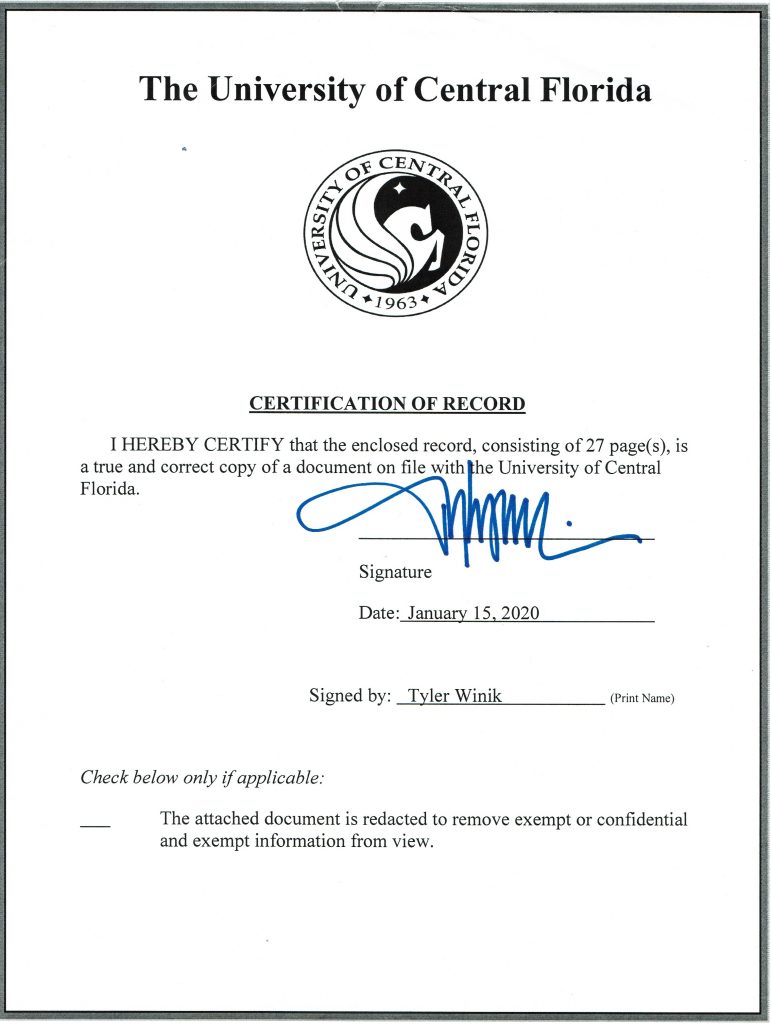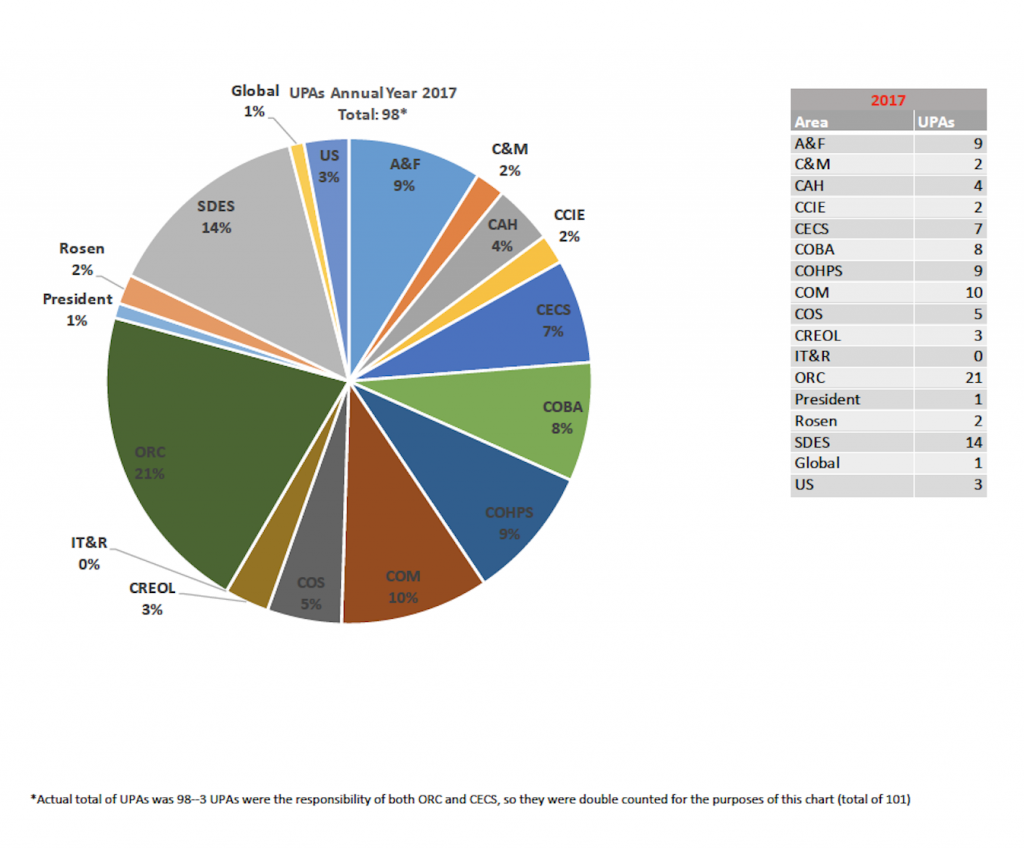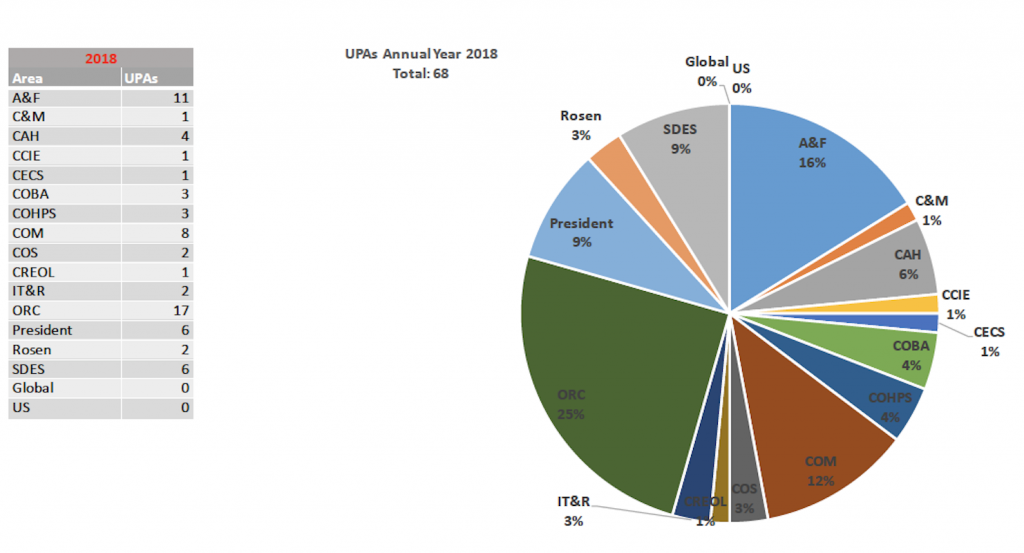A whistleblower said UCF fired him in retaliation for reporting discrimination — and for reporting that UCF spent millions of dollars on “hundreds of illegal purchases” made without following proper procedures, according to records obtained by Knight News.
Briant Coleman, who served as UCF’s associate vice president for strategic initiatives, communication and marketing until he was terminated on Oct. 18, has now filed a whistleblower retaliation complaint with a Florida commission that could take administrative legal action against UCF, according to a source familiar with the situation.
UCF spokesman Mark Schlueb vigorously disputed Coleman’s allegations in an email on Tuesday, calling the unauthorized purchases “administrative errors” made with no malintent that were not illegal.
However, a UCF form found on the Procurement Services website describes unauthorized procurements as “serious violations” that could have “detrimental consequences” to UCF.
Schlueb called all Coleman’s accusations “suspect given the context of his separation from the university.”
Schlueb referenced UCF’s Oct. 14 investigation that found Coleman violated the UCF Employee Code of Conduct and its ethical standards when he “engaged in threatening, intimidating, and bullying behavior in the workplace.”
The University Compliance, Ethics and Risk Office report reads, “Dr. Coleman has demonstrated a pattern of misconduct against employees for years … Dr. Coleman is unlikely to correct his behavior.”
But Coleman’s attorney, Mitchell Feldman, called UCF’s investigation a “pretext” to justify firing him, and claimed UCF engaged in “pervasive” bigoted and “racially motivated employment decisions,” and “discriminatory and retaliatory conduct,” according to a Nov. 9 letter to the university threatening legal action.
Knight News obtained Coleman’s performance evaluations from 2015 to 2017, which directly contradicts the statements made in the recommendations section of the investigation report.
Since 2015, Coleman was evaluated at “above satisfactory” in both written and spoken communication, according to his performance evaluations.
He also received “above satisfactory” since 2015 and 2017 in leadership, and an evaluation of “outstanding” in 2016.
Of the many terms used to describe an employee’s evaluation appraisal, UCF describes “above satisfactory” as “encourages, cohesive, consistent, and excels,” while the “outstanding” term is defined as “exemplary, exceptional, leadership, and the highest standard of excellence.”
Feldman’s 18-page letter states UCF’s “entire investigation” was “manufactured and motivated by the university in order to retaliate against Dr. Coleman for his complaints of discrimination, because of his race and sexual orientation, and likely, and more prevalently because of his engaging in protected activity under the Whistleblower’s Act.”
UCF’s attorney, Associate General Counsel Sara Potter, responded with four paragraphs.
Potter’s response — delivered by email on Nov. 12, 2019, and took all of 1.25 pages of paper — acknowledged the university received the letter written by Coleman’s attorney.
“In reviewing the Letter, we were struck by the sheer amount of misrepresentations and outright falsehoods contained therein. The University will not attempt to respond point by point to the Letter here,” Potter wrote in the letter. “However, we hope that you will seriously consider your professional obligations to make reasonable inquiry into your client’s allegations, and ensure you have evidentiary support for same, before including them in any investigative Charge or court filing.”
Coleman said in the whistleblower’s complaint he reported abuse misconduct in UCF’s procurement process — to the UCF Office of Audit, Compliance and Risk in April 2019. Feldman’s letter to the university also noted this.
Coleman received a notice that his employment would not be continued beyond Oct. 18, 2019.
“I was told by Youndy Cook and Christina Serra, director of compliance and ethics that [I] should not report this fraudulent and unlawful conduct, and that if I did, there would be severe consequences that would jeopardize my tenure at the university,” Coleman wrote in the whistleblower complaint.
Feldman’s letter also made this allegation.
Feldman wrote that the university purposefully hid the procurement violations from investigations and was told to stay silent by Cook and Serra because the university did not need negative publicity and extra scrutiny during the post-Colbourn Hall investigations.
Sr. Deputy General Counsel Youndy Cook and Interim Chief of Compliance, Ethics, and Risk Officer Christina Serra both strongly denied Coleman’s allegations.
“I said no such thing. He is lying,” Cook said in a statement. “It would be kind to call these lies,” Serra said in a statement.
Schlueb said Coleman was at a meeting where the topic of unauthorized procurement actions was discussed. “It is obvious from these allegations that he misunderstood the discussion,” Schlueb said.
Coleman wrote in the whistleblower’s complaint that part of his job was to, “… review, assess and manage contracting and procurement functions within the Office of the Provost and Academic Affairs.”
This could be read in Feldman’s letter, as well.
Between 2017 and 2018, 166 unauthorized procurement authorizations were documented totaling nearly $26.5 million, according to documents obtained by Knight News. One key document was first sent to Knight News from a source.
Knight News verified its authenticity by having UCF certify to Knight News that it was an accurate copy, which was prepared by former Procurement Officer Greg Robinson.

Schlueb acknowledged UCF officials made mistakes but reiterated that unauthorized procurement were administrative errors where departments did not follow the correct process, timeline, or similar action.
“These mistakes are not illegal. The spending was not illegal. Nor are the resulting contracts illegal,” Schlueb said in the Tuesday email. “As we explained, UCF has no reason to believe there was malintent associated with the purchases.”
But Coleman and his attorney wrote that members were circumventing the procurement process by making illegal purchases in violation of rules and regulations, and at least some contracts were being awarded without going through the required bidding process.
An unauthorized procurement action, or UPA, occurs when a department commits university funds before ensuring the proper approval is in place, or when someone who is not authorized to sign the necessary forms committing the funds, does so, according to the Procurement Services website.


When a UPA is committed, a form must be completed and the department’s or area’s vice president or dean must sign the document acknowledging the violation, and “justifying” it, through a series of answers to free-response questions, according to the Procurement Services website.
According to its website, UCF Procurement Services is responsible for:
- Processing and administering formal solicitations
- Processing requisitions for goods and services
- Reviewing and approving contracts
- Inputting supplier data for corporate suppliers
- Managing the Diversity in Contracts Program
“Competitive quotes must be obtained by the department if the total for all consolidated requisitions exceeds $10,000,” according to the Procurement Services website. “Amounts exceeding $75,000 will require competitive solicitation through Procurement Services.”
Between 2017-2018, 16 of the 166 UPAs were cited as having competition violations — totaling just under $523,000, UCF records show.




